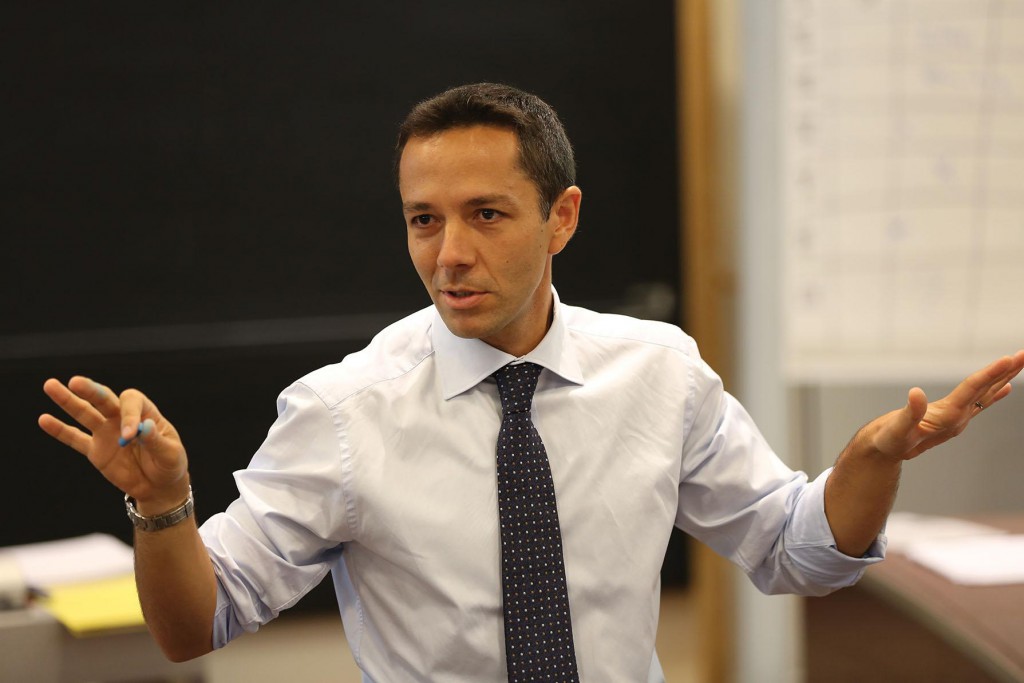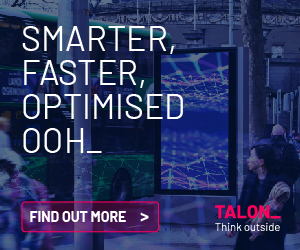 Sheena Horgan speaks with Gianpiero Petriglieri, one of the most influential management thinkers in the world. Shortlisted for the Future Thinker award by Thinkers50, he is also Associate Professor of Organisational Behaviour at INSEAD and a regular blogger for Harvard Business Review and is chair of the World Economic Forum’s Global Agenda Council on new models of leadership.
Sheena Horgan speaks with Gianpiero Petriglieri, one of the most influential management thinkers in the world. Shortlisted for the Future Thinker award by Thinkers50, he is also Associate Professor of Organisational Behaviour at INSEAD and a regular blogger for Harvard Business Review and is chair of the World Economic Forum’s Global Agenda Council on new models of leadership.
Listening to Gianpiero Pertiglieri talk about the essence of “New Leadership”, I’m struck by the language he uses. It’s all pragmatically personal from the line that “People must care about your vision”, to descriptions such as “believable” and “authentic”, to the contention that leaders “have to have some skin in the game”.
These descriptions certainly strike a chord with me as an advocate of responsible RoI that is driven by socially conscious managers. So when I caught the end of his Masterclass at the IMI, entitled The Essence of Leadership, I relished the opportunity to put a few ethical questions to one of the world’s leading management thinkers.
RE-POSITIONING VALUES
We started with Pertiglieri’s reference to CEOs and entrepeneurs as “beacons of virtue”: It’s his contention that good leaders are often as informed by the desire to uphold, sustain and even spread certain principles, as they are informed by the desire to achieve a set of goals. “Goals tell you where you are going, and your principles tell you how you should get there and why”.
Principles and values feature heavily in Pertiglieri’s lectures, writing and research. But his position on values is that they should not be “talked about as just another strategy… values in that way lose value. They become just another instrument for the achievement of goals as opposed to something that is as important as your goals… Values aren’t just a means, they’re another anchor for your activities”.
Pertiglieri also argues that once you criticise principles in terms of whether they’re useful to your goals or not, then “you’re putting principles on a secondary plane to goals”. This is in line with his larger interest in what makes business when it works well, so appealing. In his view great business “combines instrumental economic principles, with humanistic cultural principles … they are profitable, but at the same time shape culture in a way that people find interesting and appealing”.
It’s what promoted Pertiglieri’s famous tweet in praise of Apple’s success in delivering beauty and function, economics and principle.
I agree with his belief that business has the capacity to combine the economic and humanistic, though whether business has the appetite or conviction to do both is another matter. According to Pertiglieri the common practice of many businesses is putting shareholder value firmly above values and principles, and in doing so “we have subordinated the humanistic to the instrumental”.
Certainly that’s been my main experience in all my writings and research on the subject. As a CSR advocate, I regularly find myself taking the ‘doing good is good for business’ line, as a means to engage business’ interest and to elevate the consideration of and purpose of ethical values of an organisation. But Pertiglieri turns this rationale on its head in an intellectually intriguing and ethically compelling way:
Pertiglieri proffers an alternative to the subordination of values to economics as business drivers. “These are two different world views, two different principles that lead to different goals. They might be aligned sometimes but other times they conflict… and the job of good leaders is to cherish the times they are aligned and also manage the times when they’re in conflict”.
I’m sure embracing and acknowledging that these two perspectives can co-habit an organisation, generates a tension, but one I assume that results in debate and discourse – both of which are the best practice habits of successful business. While arguably favourable, co-existence isn’t the norm. The more typical approach Pertiglieri asserts is ‘either or’ ie the humanistic plays second fiddle to the instrumental value of business, or, conversely, protesters say business should be humanistic and the economics should be the subordinate and the economic tail should not be wagging the social dog. But the real question worth pursuing is “how do we get them on the same plane?”
Pertiglieri artfully articulates the benefits of making the business case for ‘goodness’ and the goodness case for goodness. He agrees that there is certainly a business case that has to do with inclusion, tapping talent, public trust, etc. when you consider values such as ethics or diversity or authenticity, but, and it’s a big but, he questions whether we should be making the business case for values and responsible behaviour at all, and instead just pitch, that it’s the right thing to do. Making the case, and effectively saying that doing good can facilitate the generation of more (sustainable) profit, he suggests “sends a subliminal message that the reason to be a decent human being is because it brings you economic advantage… ultimately subordinating values to goals… The crux though is that instead of saying goals should advance our values, its saying values should advance our goals”
It is a compelling counter argument and an insightful perspective, though one that I worry may still be lost on many a CEO. That said, Pertiglieri simultaneously presents the personal argument, regarding how people behave in the work setting. He contends that we take much of ourselves with us to work, and work is an important means to us, to clarify, shape and project our sense of self. Pertiglieri’s Medical Doctorate with a specialization in Psychiatry informs much of his research and concepts so who am I to argue? Put simply, I do think it holds true that people want to feel good about the work they do, and those in influential positions have the opportunity to exercise their personal values in this regard.
LEADERS AS STORYTELLERS
Pertiglieri’s Masterclass paints a profile of the new successful leader as a competent and coercive storyteller, one that makes viable and vibrant connections with the people they lead. He suggests they need to be visionaries who tell meaningful stories, which prompts my question, “Are the themes that resonate today changed from years gone by – more social, economic or altruistic?”
As I suspected and intuitively feels right, the stories that resonate are, Pertiglieri says, timeless. They need to be interesting, exciting and tap into the experience of being alive, with clarity and hope to counter confusion and fear (he uses Grimm fairytales as examples in his lectures). For Pertiglieri, the stories that leaders articulate must be about going on, and bringing people with you on, a journey of transformation. They must be meaningful and aspirational – a touch of the unrealistic but not impossible.
There’s also an element of co-creation in the story line where Pertiglieri suggests that new leaders move away from the reassuring story, to helping people connect and make a meaningful story. It’s about how leaders tap into a community and a sense of self within that community.
All of this leads to a very relational connection between the leader and the people. But this in my view needs to be reconciled with what Pertiglieri describes as a more transactional relationship between workers and organisations. Evidence suggests that workers are more mobile, transient and less loyal to their employers/organisations, with little expectancy of high loyalty from their employers. It’s a skewed value exchange from decades past where people held their jobs for much longer. The irony though, is that “as organisations are becoming less reliable to provide a sense of security in the future, work has become more central in defining people and that’s a real change so we’re all professionals now…. for whom work is incredibly important and organisations are, at some level, expendable”.
So the pursuit of a socially responsible agenda within an organisation does require an ethically minded, values driven leader (but not at the expense of an appreciation of shareholder value). “Management in organisations gone by were all about structures and policies, structural design elements etc. Now it’s all about the psychology and the people. And the less people trust or rely on organisations, the more they seek [out] leaders. The idealisation of leadership is a compensation for the disappointment, as a wish for the redemption from the disappointment, in organisations”.
Much of what Pertiglieri contends flies in the face of management speak passed down over decades. But if there’s one thing that the technological revolution has taught us, it’s that nothing stays the same. Pertiglieri’s view that business leaders are human, workers are human, and businesses can have a human side, sits well in a more socially conscious and shrinking business landscape – one where emotional intelligence is a laudable management trait, and CSR is a credible agenda item.
One of the most interesting points Pertiglieri makes is that while leaders must have some idealism, they must also be able to question themselves. The former quality is what you might expect in a strong leader, someone with ideals that they can articulate well. But the latter quality is the more interesting one, because as Pertiglieri says ideology without question is fundamentalism, and as society evolves, what we deem to be acceptable, appropriate and ethical, shifts over time. A good leader so, is willing to question their viewpoints and convictions, and from a CSR perspective that’s got to be a good thing doesn’t it?
Prof.Gianpiero Pertiglieri was speaking at the IMI on February 3rd as part of its Future of Work Masterclass series, in association with Zurich.,The next two Masterclasses take place on May 20th and November 25th. For more information got to www.imi.ie.
First published in Irish Marketing Journal (February/March 2015)© to order back issues please call 016611660




















